Ten additional types of website.
We've extended this series of articles, 20 Different Types of Websites, to cover 10 further website types, some we hadn't covered previously and others that have newly emerged since part 1 and part 2 of this series. We know it now no longer adds up to 20, but for consistency (and for search engines), we've retained the original title...
21. Property websites – e.g. Rightmove
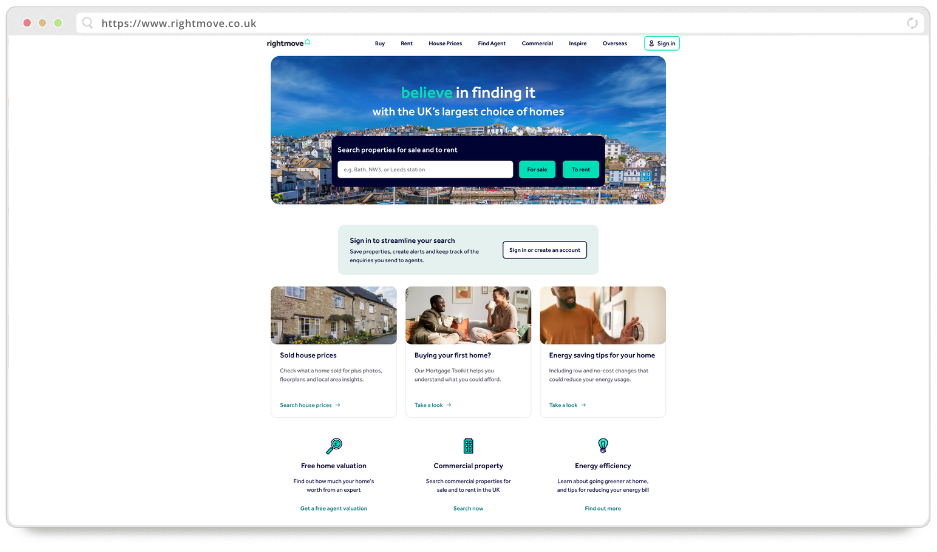
A property website is one that allows multiple estate agents or letting agents to list properties. Agents can sign up to these larger listing sites, typically for a monthly or annual fee, in exchange for listing properties they are either selling or letting.
Users can generally create an account on these sites and save their search preferences for either purchasing or letting a property as well as adding comments and locations of interest. Filters include price, location, number of bedrooms, when the property was added to the site, and its status e.g. whether the property is under offer or sold subject to contract.
Users can then also set up an alert to be notified when new properties that match their required specifications are added to the site. This can be useful in a competitive market where moving fast to book viewings of desirable properties in order to be in a position to put in an offer to buy or to rent is essential.
The benefits of these websites to smaller estate agents is that they gain more coverage and views for the properties they are representing; and ultimately, they are likely to sell or let those properties more quickly than if they were to advertise them only on their own sites. The downside is the ongoing cost.
22. Review websites – e.g. Trust Pilot
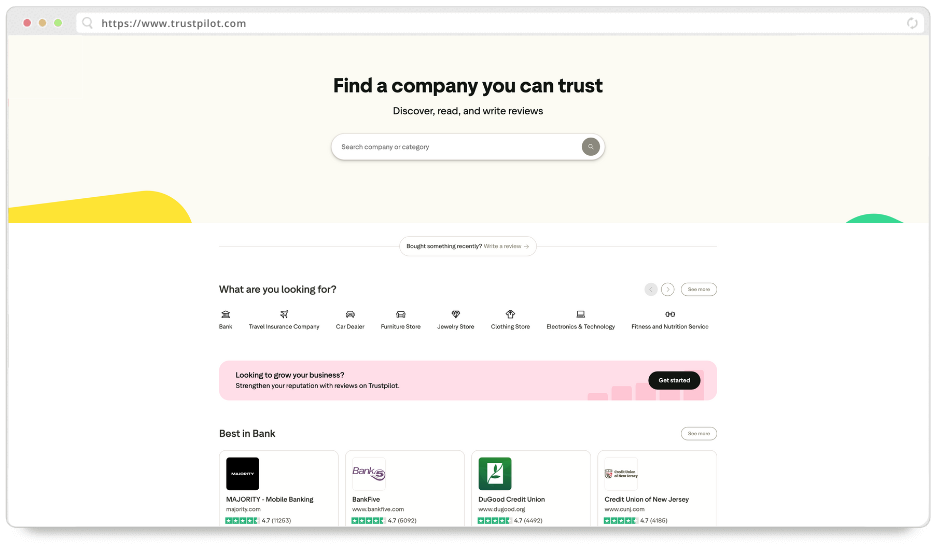
A review website is one in which any business (or one in a particular sector or category) can have a profile, and customers will be able to leave a review of the businesses listed.
The online form that allows for this will usually ask customers to leave the business a rating out of 5 and then give them the option to write their own additional review to go with their rating. The length of the review that is allowed is often limited to a certain number of characters, with the limit varying from one site to site.
Review websites give customers the opportunity to share their experiences of businesses, either good or bad, that can then help inform other potential customers whether or not to choose to use a business in future, as well as giving Google and search engines more confidence that the business should be listed highly in search results.
If businesses are dedicated to offering a good customer experience and service, then having a profile on these types of sites can be of great benefit to them. Positive reviews that show the business in a good light and confirm they provide an excellent service could lead to further business opportunities in the future.
The main downside of these sites is that if a business fails to meet certain customer expectations in the service it offers, it is likely that they will receive one or more negative reviews from an unhappy customer or customers, which can start a negative feedback loop that then turns potential customers away and causes the business to lose enquiries or sales.
One or two bad reviews in isolation are generally unlikely to have a critically detrimental impact on a business if the business owner replies to them, and if these are balanced out by a significantly higher number of good reviews; but a string of bad reviews in short succession can indicate that a business is experiencing difficulties in its ability to provide a satisfactory service, which can seriously hurt its long-term reputation even if the difficulties are temporary, for example owing to staff absences or orders being delayed in their fulfilment or cancelled altogether as a result of a surge in demand, or supply-chain issues.
With reviews on a site like this, it is considered best practice for businesses to reply publicly to the review. If they receive a positive review, then they should thank the customer, while if they receive a negative review, then they should attempt to acknowledge the complaint with a courteous reply and offer a satisfactory path to its resolution without divulging details that breach customer confidentiality. This is likely to involve offering to talk directly with the customer in private in an effort towards identifying and resolving the issue. Replying to customers who are unhappy in a way that shows willing to put the situation right will show future prospective customers that the business values customer satisfaction, and is willing to listen to and learn from customers’ experiences to the end of improving them. Replying to all customers also helps to demonstrate that the business is still operational and that others can therefore order from them with confidence.
23. Marketplace websites – e.g. Etsy
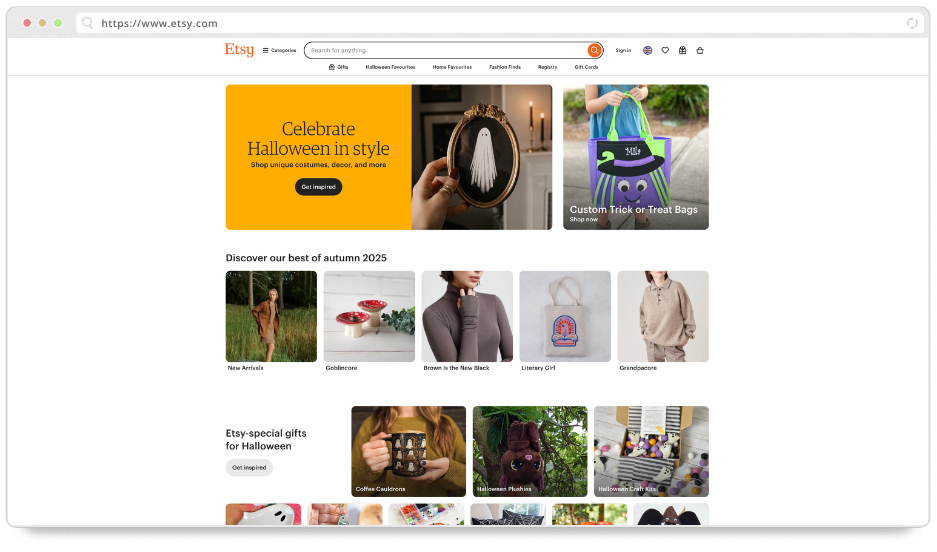
A marketplace website is one that offers the chance for large numbers of businesses each to create a seller profile or virtual shop front from which they can sell their goods online. Thus, a marketplace is similar to an ecommerce website but with the difference that it provides a shared online retail space for many different businesses rather than being dedicated to the operations of a single business.
In some cases, smaller businesses use a marketplace website as they do not have an independent website of their own and lack the budget or know-how to set one up. In others, they use these marketplaces for the advantages of visibility they bring. Popular marketplace websites have very large captive user bases who routinely browse them and search for products they want to buy.
Even when it does have its own website, a small business may find that it cannot compete cost-effectively for visibility in search engines such as Google for the kinds of products it sells, and is therefore better served by using a marketplace website where it is not necessarily the biggest and longest-established businesses whose results will appear first, and can instead show the products that have been listed most recently or are the lowest priced, depending on the individual user’s preferences.
These marketplace websites can be a good testing-ground for smaller businesses that want to try selling online without the larger overheads that come with creating and managing their own website.
Depending on the rules of the particular marketplace, business users may pay a fixed monthly fee to have an online presence in the marketplace at all, as well as a percentage commission of each sale that they make. In other cases, there may be a free membership option with a higher percentage commission paid on each sale.
Marketplace websites whose participating sellers list physical goods sometimes require the individual seller to arrange the shipping of their own goods to the customer in fulfilment of each order that comes in. The customer would make payment to the marketplace, which would then automatically pass on to the individual seller their share after commission. The individual seller would also receive a notification that a purchase had been made, prompting them to fulfil the order by packing and posting the goods.
Marketplace websites do not only attract small businesses. There are also some very large operations with huge warehouses and many thousands of individual listings that use them, sometimes alongside their own independent websites, to add to their total sales reach.
Not all marketplace sellers even keep the goods they list in stock. Some may prefer to drop-ship via a third-party service. For example, some Amazon marketplace sellers subcontract warehousing and order fulfilment to Amazon themselves, for the benefits of lower shipping costs and greater time-efficiency of operations; and some booksellers will not keep stocks of most new book titles but will use a major distributor to drop-ship them directly to the customer.
24. Finance and investing websites – e.g. Hargreaves Lansdown, Trading 212
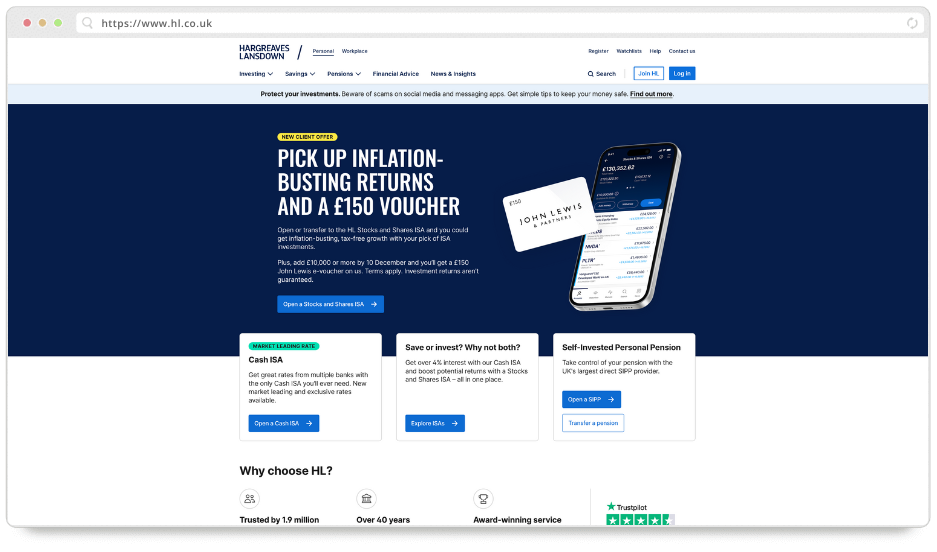
A finance and investing website allow users who register an account on the site to invest their money in certain stocks, shares, funds and bonds, and to sell these again (depending on the type of investment, and potentially subject to a lock-in period or arrangements for more illiquid investments) when they mature.
The choice of investments can either be self-managed, subcontracted to a human fund manager, or to an automated artificially intelligent program that takes decisions based on formulae (these decisions can simply track an index, in the case of tracker funds). Financial services compliance and regulations mean that the user will typically either select a level of risk they are happy to accept (related to the potential reward, but also to the potential loss of value of their investments), or will have to accept the risk profile associated with a certain fund - the declared appetite for risk and potential reward is an important determinant of what funds the user ought to be investing in.
A self-managed portfolio requires the user to buy and sell their own assets as and when they think the time is right according to the trends in and current position of the market, in order to make the highest possible return and limit losses.
Alternatively, if the user would rather have their portfolio managed without the concern of strategically timing and actively orchestrating their own buying and selling, they can select a risk level from low to high, and the fund's managers or program will handle the funds in accordance with the desired risk level. Higher-risk investments are likely to be more volatile in value, thus having the greatest potential for both gains, which makes them attractive to those looking for higher returns, but risky for those who lack the experience and expertise needed to reliably time the market - or who are not looking to invest over a longer period of time, perhaps because they are getting close to retirement.
Regardless of how a user decides to use these types of websites, investments all carry risks; and returns are not guaranteed. Users should do their research before using these types of website and ensure they understand the terms and conditions and how their money will be used.
Before using any website of this type, you should ensure that it is regulated by the Financial Conduct Authority (FCA) and covered by the Financial Services Compensation Scheme (FSCS). This ensures that if the business running the website ceases to be operational, customer investments will be protected up to the value of £85,000 per person.
Investing websites based overseas, and those involved in crypto-currency trading, typically do not carry any such protections for the UK-based consumer. There have been multiple cases of overseas funds going bankrupt and of cryptocurrency exchanges shutting down suddenly and taking their users’ crypto-assets with them, or suffering heists in which assets are stolen by malicious actors.
25. Comparison websites – e.g. Compare the Market, Skyscanner
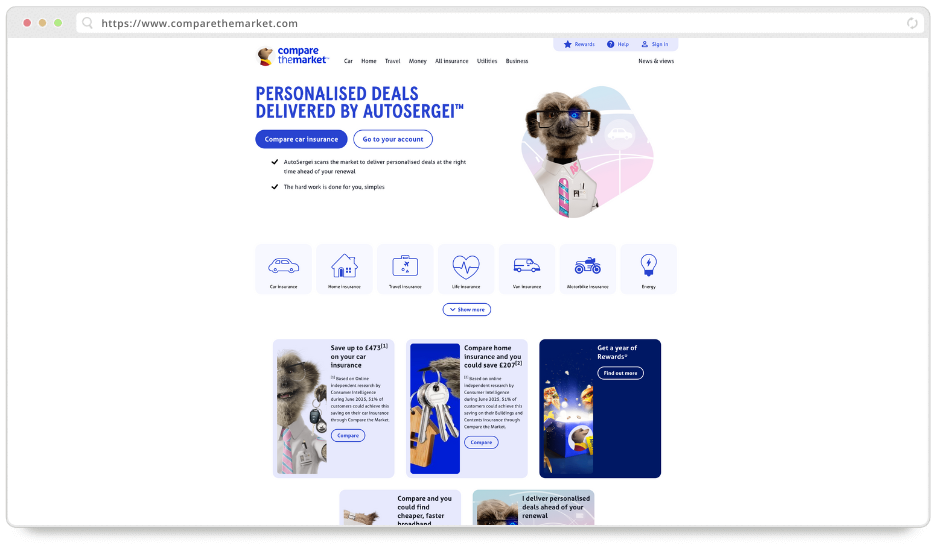
A comparison website is one that will show users a variety of options for the procurement of a particular type of product or service.
Several of the most popular comparison websites in the UK specifically target higher-value services, such as car insurance, home insurance, business insurance, domestic energy supply services, broadband telephony, satellite or cable television network subscriptions, air fares, and accommodation in hotels or hostels. In all such categories, there are usually many companies offering similar options and services at competing prices, among whom some will also offer services to a higher specification (for instance, high-value home contents insurance) at a correspondingly higher cost.
A comparison website will collate all of these options depending on the user’s search query and list in response all providers who meet the user’s criteria and have a business arrangement with them in return for a commission. Some will also offer briefer comparative listings of providers who do not have an arrangement with them, but typically without including a direct link. A typical search result for a service such as electricity supply will show a range of options, some more expensive, some less expensive, along with details of what is included in each, or clickable links to find out more.
Other comparison websites instead focus on products, for example electronic goods such as cameras or televisions, or other types of goods such as new bicycles, indicating the current asking prices of multiple different providers for particular makes and models.
Comparison sites are able to create revenue either by charging listing fees or subscription fees to the businesses that it features just for the right to be seen in the results at all, or by earning an affiliate commission percentage when a user clicks through to a business from their site and continues to make a purchase.
These sites can be a positive for customers as businesses know that unless they propose competitive offers and prices, they are unlikely to be selected by customers; and making an informed choice on price can allow canny consumers to save money in the long run - provided that they are not compulsive shopaholics who are in the habit of cumulatively buying beyond their means when faced with the temptation of multiple bargains, of course!
26. Health websites – e.g. Healthline, NHS
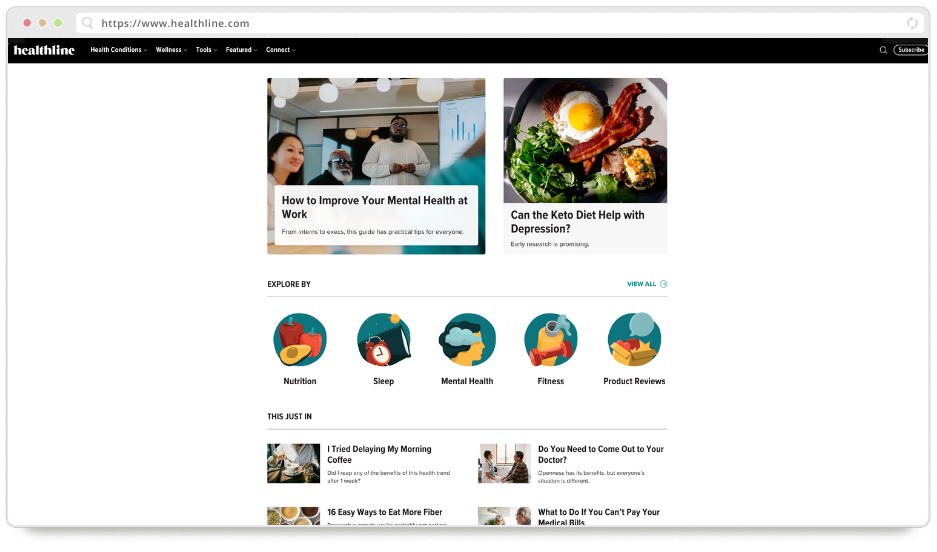
A health website is one that offers information on a range of medical conditions, concerns and queries. The best-known ones are provided by specific medical bodies or organisations with a proven level of professional expertise.
There are also others run by alternative health practitioners and advocates of alternative health regimes, which may or may not be run by individuals with professional competence in mainstream medicine or who have had traditional training - these potentially may need to be approached with more caution.
Users of the more comprehensive and authoritative health websites can typically search within them for specific medical conditions, calling up information pages that provide a description of the condition, its symptoms, its prognosis, the range of available treatment options, and advice on when and by what means users should seek professional medical attention. Depending on how acutely ill their symptoms indicate they may be, the advice may be to ring 111, attend a pharmacy, book an appointment with their GP, or, in more urgent cases, go directly to the accident and emergency centre at their nearest hospital.
Where possible, a health website will help users identify the symptoms of both serious and less serious conditions, covering everything from the common cold to meningitis, from indigestion to a heart attack, and from chickenpox to possible signs of cancer.
Competently run health websites can often be a useful first port of call for individuals who have certain symptoms and want help in determining the best action before they turn to the NHS or simply their local pharmacy. These sites can also be useful in offering explanation and advice on minor conditions, as well as more serious ones.
However anyone using medical websites for information on conditions and advice should evaluate whether the website they are using is moderated and approved by an authorised medical body, and how material and articles on the site have been sourced, as well as what controls are in place to help prevent bad or unhelpful information being propagated.
No matter how much a written description of symptoms may appear to correspond to what you are experiencing, only a trained doctor is qualified to make a professionally-informed diagnosis based on the evaluation of symptoms, signs and other evidence such as blood tests and scans. Health websites are provided as an educational and indicative initial advice service; and if patients are concerned that they have a condition that may need treatment, they should ideally seek out a medical professional via the NHS (generally their own GP) in the first instance, which will help to rule out conditions or issues that someone without similar training may not spot.
27. Travel booking websites – e.g. Airbnb, Booking.com
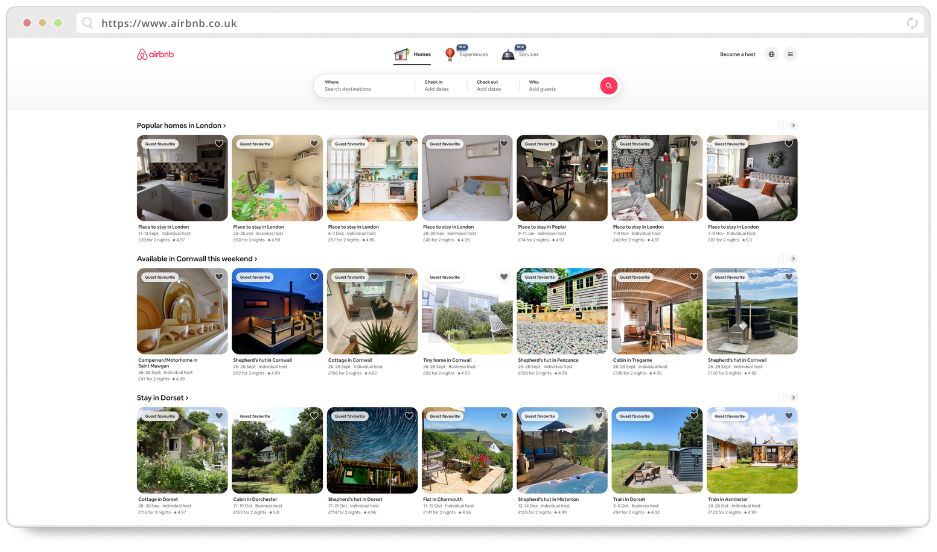
Travel booking websites differ from comparison websites listing related services in that instead of providing you with choices between different independent airlines, hotels, hostels or holiday accommodation providers and linking you out to them, they require you to make payment directly to themselves, and will then compensate the individual providers they work with after pocketing a significant commission.
When entering a travel booking website, you will be presented with the option to search for your chosen destination and dates for the specific break or stay you have in mind. Alongside the option to search within the system, you may also find sponsored or promoted special offers and top destinations directly linked from the home page.
The search option lets you use a variety of filters in order to find your perfect get-away. These include travel dates and, often, the option to add whether or not you can be flexible on these by a number of days in order to find a better match or lower price. You will also be asked to specify the number of travellers you would like to book for, and whether each is an adult or child, alongside your departure location and your destination.
Travel booking websites vary widely in the range of services they offer. Some are specifically suited to the booking of accommodation; others are only concerned with travel, be it by air, by rail or by all forms of public transport; and still others offer package services whereby accommodation and flights are provided together for a total price.
Once you have conducted your search, you will be provided with a number of results including links you will be able to click upon, revealing more information on the specifics of each result. In the case of searches that include accommodation, these details will usually include a description and photos of the potential accommodation, as well as customer reviews of the accommodation, and details on room type and whether or not breakfast is included or can be added. You are likely also to be presented with different prices depending on whether or not you require the booking to be fully or partly refundable in the event of your needing to cancel or reschedule.
Collectively, travel booking websites offer an easy way to search a wide range of options fast and efficiently to help you choose your travel and accommodation arrangements.
28. Learning/Education websites – e.g. Skillshare
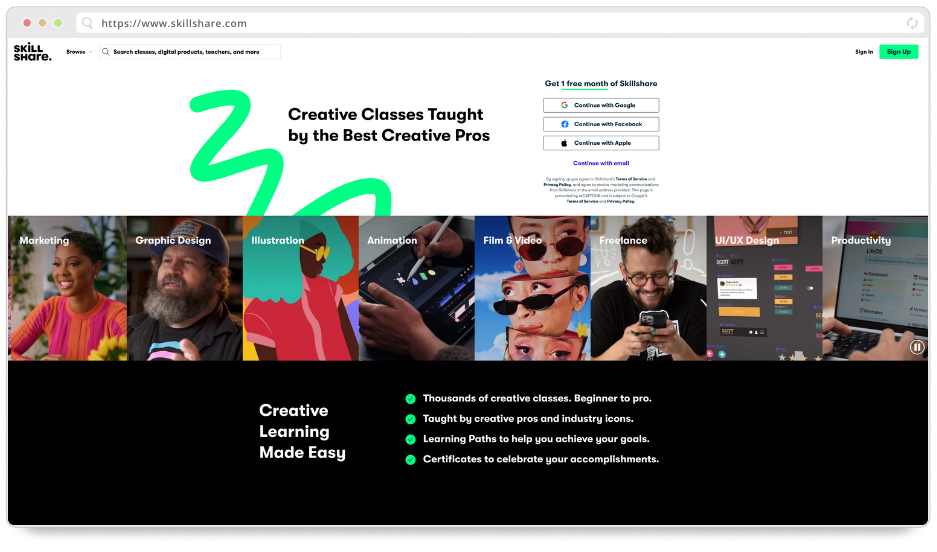
An educational website is usually one that offers learning courses or programmes that can range from spending a specific block of time, such as a one- or two-week period, to an hourly weekly or bi-weekly commitment for a predetermined number of weeks or months.
Some educational websites will offer free courses, while others may require payment that is needed either in full before the course has been started, or monthly, be it for a contracted period of time or on a rolling, subscription basis.
Whether you pay a fee for the full length of the course or a monthly subscription will depend on the type of educational website you are using. Websites that work on a monthly subscription basis usually offer a variety of courses that you can choose from, with the option to work through multiple ones simultaneously if you have the time.
Though some are more specialised than others, educational websites collectively offer courses across a broad range of subjects, so there is extensive choice when selecting the course right for you.
Courses such as these offer the opportunity for the user to upskill in their current area of expertise or learn a skill relevant to an industry or field of work that is new to them, but that they might either want to learn more about or already have decided to try to break into.
Upon completion of their courses, some educational websites offer certificates or other specific forms of accreditation that the user can then declare and highlight when advertising their own skills and qualifications, whether on their CVs or on job application forms.
29. Event websites – e.g. Eventbrite
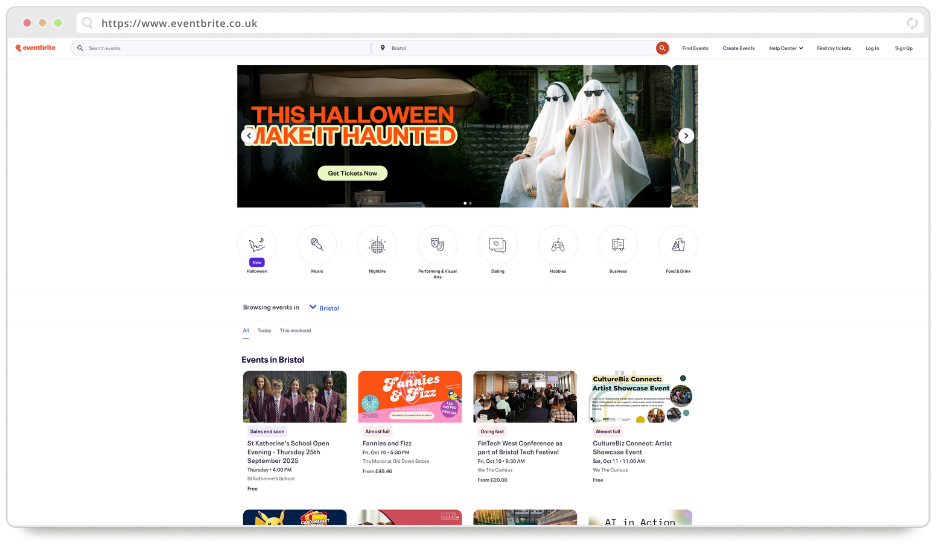
An event website is one through which users can organise, arrange, register for, and (in the case of paid events) purchase advance tickets for particular events. Other options such as confirming planned attendance closer to the date and time of the event may also be offered by some, to help organisers anticipate numbers of attendees, which can be especially valuable in the case of free events where people have registered in advance but may well drop out.
If creating an event as its organiser, you will usually be able to give the event a name, upload a photo, write a short summary of the event, write a longer description, select a category, provide location and time details, specify the ticket price and your cancellation and refund policy (if applicable), and select specific tags that help users with relevant interests to search for the event. The longer description is an opportunity to give users more context and a clearer idea of the facilities and agenda they can expect, and should give them more confidence that it is relevant to them and worth attending than a headline or brief summary would by itself.
The events website will compile these details into a consistently presented page that will act as a landing page for your event. You are then free to share the URL link of the page across your networks in order to promote it and sign people up to attend.
Users of event websites can browse upcoming events in their area or select a certain location and category in order to search for something specific - allowing the event organiser to get their event in front of more people than would otherwise be the case.
A website of this type asks new users who want to use them as event organisers first to create a profile, which will also be processed into its own page. Users of the site who are interested in attending events are given the option to follow any organiser in order to stay up to date with upcoming events they are hosting, usually by email or instant notification. Thus, for an event organiser, a profile page can be a valuable asset for building momentum behind a series of events.
Once a user has confirmed their planned attendance of an event or purchased a ticket, the organiser will receive a notification or sales confirmation. This helps organisers keep track of attendees. Some event websites even offer a dashboard option that allows tracking of attendees to do this.
30. AI chatbot websites – e.g. ChatGPT
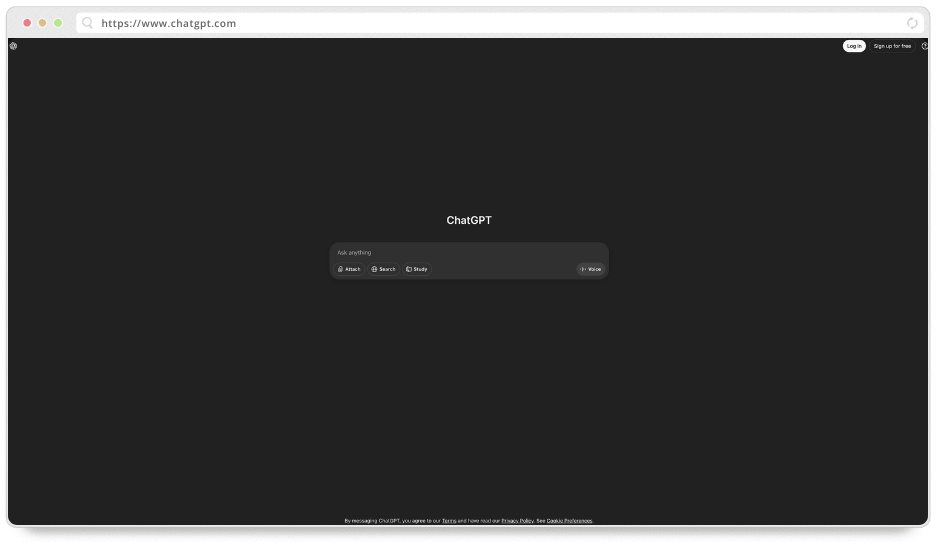
An AI chatbot website is a relatively new concept. This type of website has sprung up in the past few years and has rapidly gained a very large global user base. These websites typically use generative artificial intelligence via a Large Language Model that is trained on a vast amount of information in order to produce answers to questions, simulate natural conversation and generate text.
Some will allow immediate access to the chatbot so you can simply navigate to its URL and start a conversation, ask a question or type in your prompt (the standard term for a written instruction to a chatbot). Others will require you to create an account first. Depending on the website and your needs, it may be necessary to sign up for a paid subscription in order to gain access to more advanced features or a more reliable and rapid connection. Advanced features that are unavailable to free subscribers may include high-resolution image creation and video creation, though some AI chatbot websites offer free image creation within certain restrictions.
AI chatbot websites can be used for a variety of tasks such as research and investigation, answering questions, drafting reports, creating text in a certain tone or style, idea generation, planning travel itineraries, producing web copy, drafting imaginative stories including elements you specify, drafting computer programming language code for particular functions and purposes, and creating meal plans. Your imagination really is the limit here in terms of the prompt you create for the chatbot to interpret and return a result for.
It is wise to exercise caution when using a website of this type for factual research, as they can easily make mistakes in the information they present and answers they produce. AI 'hallucinations', the name given to instances of the system offering a response that implies as a fact something that is not true, can occur when the model has insufficient data or understanding of a topic and forges false connections between disparate pieces of data to which it has access. Large language models typically attempt to fill gaps in their learning by making probabilistic assumptions, with the result that sometimes its responses are misleading in ways that an expert on the topic who knows more about it than the sources to which the LLM has access would instantly recognise.
Human fact-checking of the output of chatbots when they are tasked with statements of fact is essential to ensure that errors are picked up and corrected.
Controversial issues have arisen relating to how these new types of websites train their AI systems, sparking widespread ethical debates and legal concerns. Currently they scrape much of the World Wide Web freely, as well as digitised books to which they have access, both for information and data that they are then able to use to feed into the outputs they produce. The question of where the line should be drawn in terms of content ownership and copyright law keeps coming up, with content publishers arguing that these AI models should be subject to regulations and restrictions governing the scope of their training from copyrighted sources.
This debate is ongoing in 2025 and is likely to evolve over time - users of AI chatbot websites will potentially be impacted by developments in this area when legislation changes. This may mean that some content created by AI chatbot websites is subject to copyright claims by the original owners, creators or publishers of the material that fed into them. As a user of the content produced by AI chatbots, you should try to be careful that any content they produce that you then publish does not infringe the rights of original content creators.
It is also advisable to read and follow the terms-of-use policy when using these sites for generation, in order to protect yourself and your business. For example, some of these sites have policies that any output produced using them by users with free subscriptions will be shared publicly, and you may find that you cannot claim your own copyright over it, in the event of your publishing it in any form.
Here, we've covered an additional 10 different types of websites to compliment our existing articles 1-10 types in part 1 and 11-20 types in part two. We hope you will find these further types of websites interesting and perhaps they can even be used as inspiration for your own project. If you have an idea for a website that you wish to discuss further, please get in touch with one of the team. We would be happy to help.
